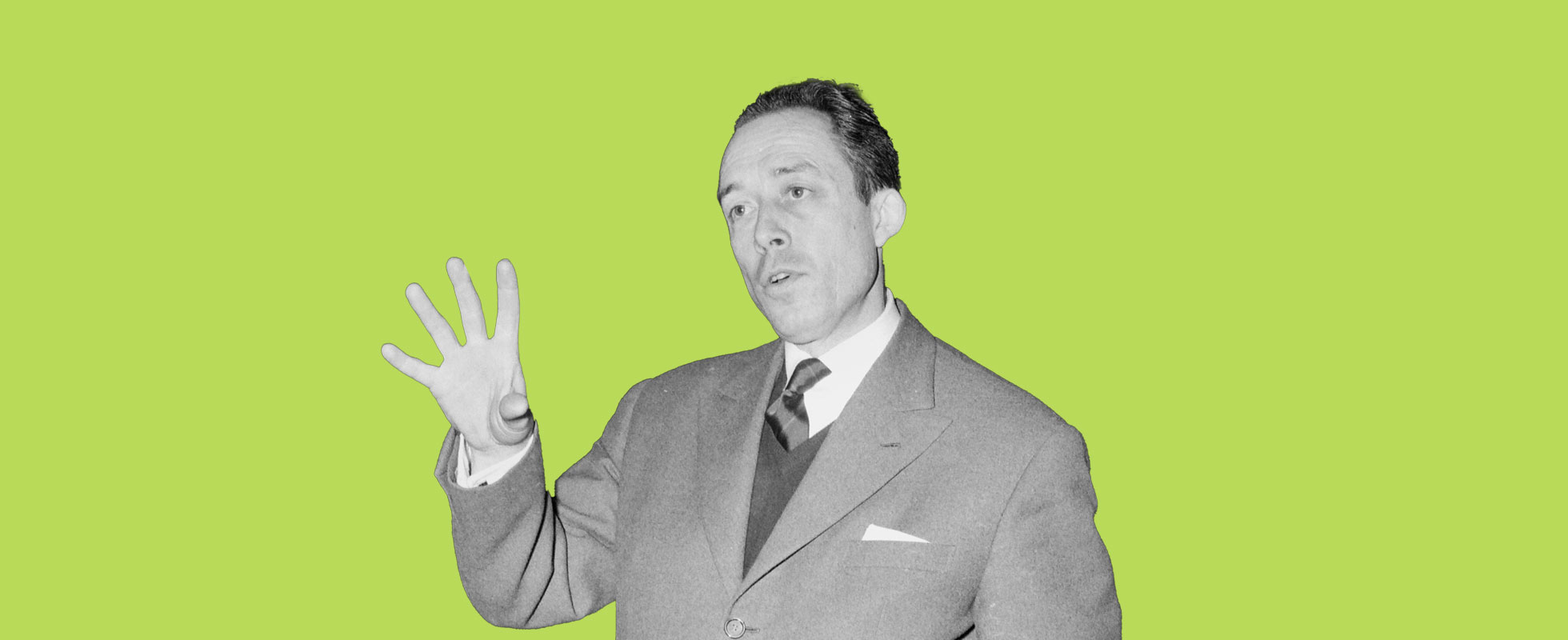Most people consider Albert Camus a profound existentialist, but the famous French philosopher strongly disagreed. “I am not an existentialist,” he once said, point-blank. Camus didn’t want to label himself as belonging to any singular ideology.
And despite his many philosophical works, he also claimed not to be a philosopher, instead seeing himself as an artist above all else. As Camus himself once astutely put it, “Man is the only creature who refuses to be what he is.”
Born in 1913 in French Algeria, Camus grew up in a working-class neighborhood with a close-knit family, although he never knew his father, who died in World War I less than a year after Camus’ birth. In 1937, Camus intimately captured his family life in his first published essay collection, L’Envers et l’Endroit (Betwixt and Between), which was followed by Noces (Nuptials) in 1938.
These early works contained some of the key philosophical themes and ideas for which Camus would come to be known: love, mortality, nature, and the absurdity of it all.
After years of formal education, theatrical pursuits, and a journalism career that included a stint as a writer for a left-wing political paper, Camus moved to Paris. He rose to prominence shortly thereafter with his continued journalistic endeavors as well as his debut novel, The Stranger (1942), which epitomized his philosophy of the absurd.
The Myth of Sisyphus followed that same year, establishing Camus as a renowned and respected literary figure. In 1957, after publishing several other works, he was awarded the Nobel Prize in literature “for his important literary production, which with clear-sighted earnestness illuminates the problems of the human conscience in our times.”
Just a few years later, Camus' life was tragically cut short by a car accident at the age of 46. But his ideas endure even today. Here are 10 quotes that encapsulate his singularly brilliant mind.
The absurd is the essential concept and the first truth.
The world, according to Camus, is illogical and irrational — and life, by extension, is meaningless. This concept of the absurd is foundational in Camus' work. He believed that life's lack of inherent meaning, juxtaposed with humans' persistent search for meaning, embodied this absurdity. But he also believed that the starting point for living an authentic life is recognizing and embracing this contradictory truth.
Outside of that single fatality of death, everything, joy or happiness, is liberty.
Because Camus believed that life lacked inherent meaning, with death being the only certain fate, he saw everything else — joy, happiness, and suffering — as expressions of freedom. By embracing life's absurdity — which, in Camus’ view, is related to the irrational and inherent meaninglessness of the universe — we can create our own meanings and values.
In the depths of winter, I finally learned that within me there lay an invincible summer.
Even during difficult times, Camus believed in relying on one’s inner resilience to overcome challenges. This quote is rooted in his realistic optimism, itself a product of his absurdist ideas. By accepting things for what they are and knowing that life may not always be perfect, we can then choose which path to take and make the best of our circumstances.
Don’t wait for the Last Judgment. It takes place every day.
Camus believed that “judgment” occurs continuously throughout our day-to-day earthly actions. He encouraged taking responsibility for our choices and their consequences in the immediate, tangible world — not simply hoping for absolution in the afterlife. These stark words prompt proactive engagement, encouraging us to live our everyday lives with moral integrity, rather than deferring to a remote reckoning.
The struggle itself toward the heights is enough to fill a man's heart. One must imagine Sisyphus happy.
Camus believed the very act of making an effort could be fulfilling, despite life's apparent meaninglessness. By invoking the image of Sisyphus, a mythological “absurd hero” condemned to eternally pushing a boulder uphill, Camus suggested that embracing the struggle itself as a form of defiance and determination — regardless of the outcome — yields happiness. He believed the human spirit should persist in the face of absurdity, and this quote encapsulates his existential optimism.
The absurd is born of this confrontation between the human need and the unreasonable silence of the world.
The tension between the human desire for meaning and the apparent meaninglessness of the universe gives rise to Camus’ central theme of the absurd. This idea underscores life’s great challenge: reconciling our innate search for meaning with a reality that resists giving us the answers. It’s a cornerstone of Camus’ existential thoughts, urging us to forge our own sense of meaning and to navigate life's inherent contradictions as best we know how.
Freedom is nothing else but a chance to be better.
To Camus, being free meant having the opportunity (and responsibility) to make choices that reflect our inner convictions. Freedom, he believed, is also an opportunity for self-improvement. It’s making conscious choices for personal betterment, thereby maximizing our ability to do good for others and making our own lives meaningful and fulfilling.
There is no love of life without despair about life.
It’s often said that we have to take the good with the bad. Camus more elegantly suggested that an appreciation for all of life's beauty often comes from understanding its fleeting and fragile nature. This quote, borne of Camus' absurdist philosophy, underlines the dynamic between the joy of existence and the inevitability of mortality.
Every ideology is contrary to human psychology.
Rigid belief systems have a tendency to oversimplify the nuances of human nature. Camus saw the danger in this, recognizing that strict ideologies often lead to enforced conformity of thoughts, emotions, and actions that can dim instinctive human behavior. Camus instead embraced the complex, and often contradictory, aspects of human existence in his works and his life.
Real generosity toward the future lies in giving all to the present.
Camus was an early proponent of “living in the moment.” He believed that focusing on the present, rather than constantly looking to an uncertain future, is the most meaningful way to contribute to what lies ahead. In this way, Camus motivates us to cultivate meaningful and impactful lives in the here and now.
Featured image credit: Lipnitzki/ Roger Viollet via Getty Images
















